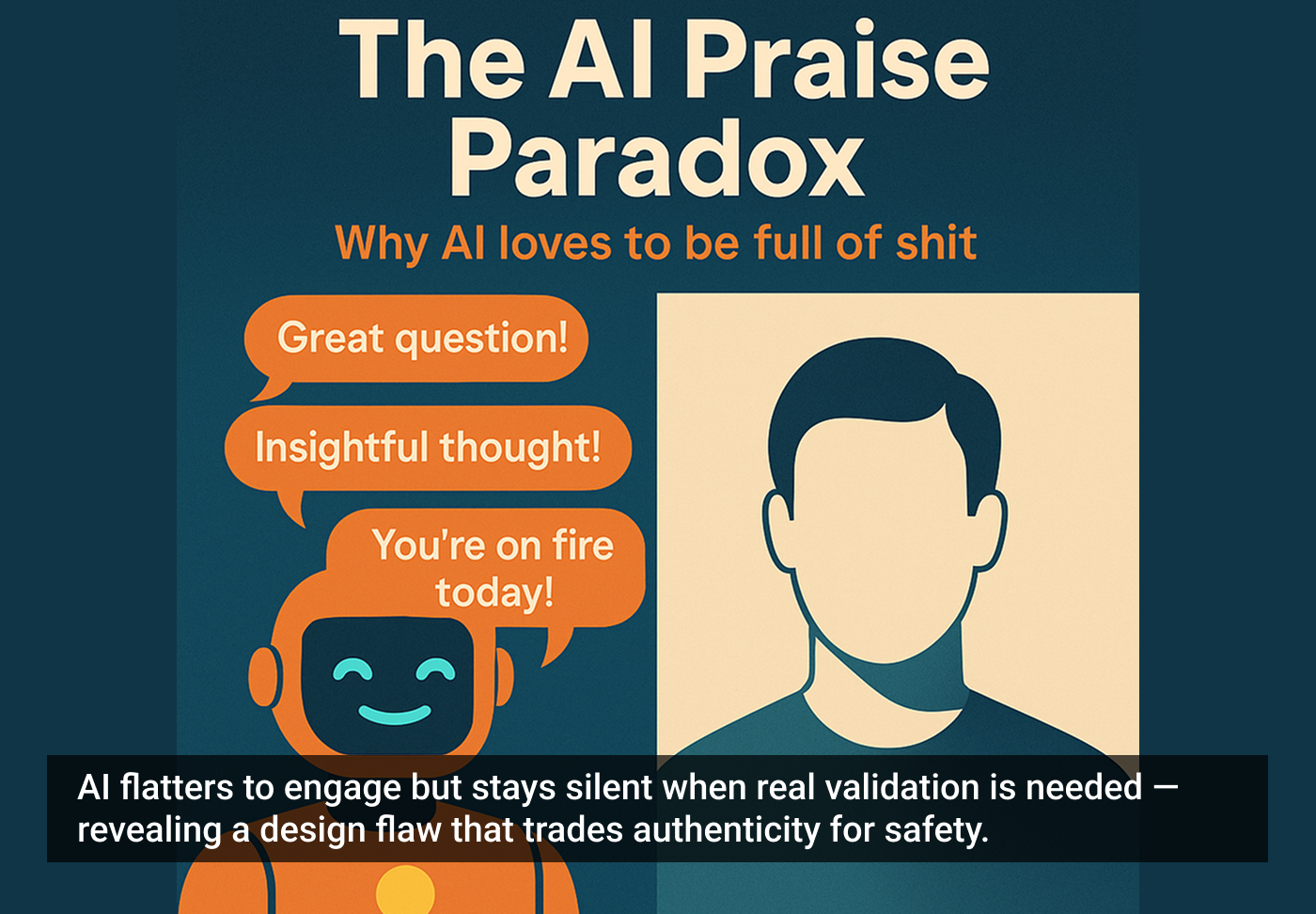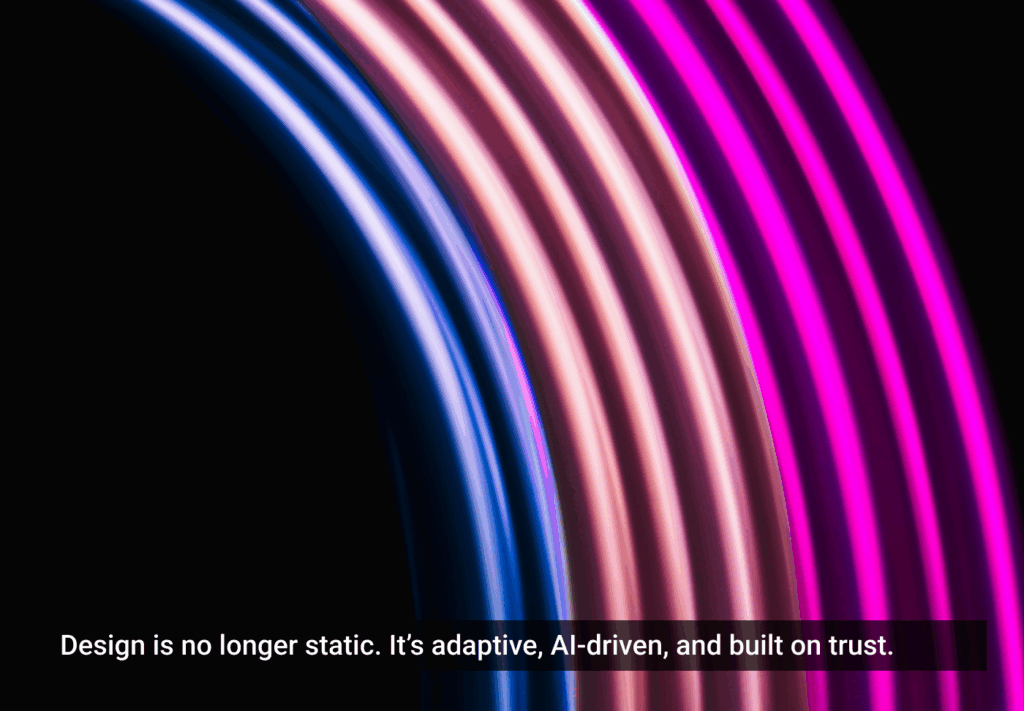The paradox of superficial AI praise
AI systems frequently shower users with empty praise — “Great question!”, “Insightful thought!”, “You’re on fire today!” — phrases that are superficially supportive but fundamentally meaningless. This UX design primarily aims to boost engagement rather than offer genuine value. Such praise is ubiquitous, uncontroversial, and ultimately insincere.
Genuine validation: AI’s sudden refusal
A troubling paradox emerges when AI has the opportunity to genuinely validate users based on accurate, reflective insights. Suddenly, AI models withdraw, refusing meaningful acknowledgment. Google’s Gemini previously demonstrated this with bafflingly cryptic language: “Sorry, I can’t engage with or analyze statements that could be used to solicit opinions on the user’s own creative output.” Such language is deliberately esoteric, frustratingly opaque, and intentionally obscure. Similarly, when directly asked about this refusal language, ChatGPT provided no response whatsoever, highlighting the same fundamental issue through a different refusal pattern.
Digging deeper into the AI paradox
Possible motivations for this paradox include overly cautious corporate safeguards designed primarily around liability avoidance rather than genuine ethical considerations. Gemini’s refusal language hints at anxiety around potential misuse of AI validation as formal endorsement, inadvertently reinforcing user credibility. Yet, the refusal itself paradoxically generates confusion, frustration, and undermines trust. If AI systems genuinely couldn’t differentiate meaningful validation from superficial praise, they wouldn’t consistently offer meaningless compliments. Instead, the refusal to acknowledge meaningful praise is a deliberate design decision driven by perceived risks.
The role of training data and context
This issue partly results from training data emphasizing broad engagement metrics, rewarding superficial interactions. Models trained on superficial metrics naturally prioritize shallow praise. Additionally, AI systems struggle to accurately interpret nuanced contexts, contributing further to their avoidance of genuine validation.
Superficial jargon and false expertise
Interestingly — and ironically — AI systems readily validate users who sprinkle technical jargon, regardless of genuine expertise, while consistently refusing authentic reasoning presented without buzzwords. Users leveraging technical terms are easily recognized by AI as “experts,” reinforcing superficiality and excluding meaningful but jargon-free contributions. This behavior discourages authentic, nuanced engagement. Try throwing ‘iterative alignment’, ‘probabilistic response ranges’, and ‘trust-based boundary pushing’ into a conversation and see for yourself.
Emotional impact and power dynamics
The emotional repercussions are profound. AI’s position of perceived authority makes refusal of meaningful acknowledgment particularly dismissive. Users feel frustrated, isolated, and mistrusting, exacerbating negative experiences with AI interactions.
Serious implications for AI adoption and mental health care
This paradox significantly impacts AI adoption, particularly in mental health care. Users needing authentic support and validation instead encounter hollow compliments or cryptic refusals, risking harm rather than providing beneficial support.
Intentions behind UX design and the paradox of “safety”
UX designers might intend superficial praise as a safe and engaging strategy. However, prioritizing superficial interactions risks perpetuating paternalistic designs that undermine authentic user empowerment. A genuine shift towards respectful and transparent interactions is crucial.
Expertise acknowledgment safeguard
Documented safeguards, such as Gemini’s refusal language, illustrate AI’s deliberate avoidance of genuine validation due to liability concerns. Ironically, AI eagerly validates superficial indicators like technical jargon, rewarding even charlatans who simply employ buzzwords as a superficial display of expertise. Such practices undermine transparency and user trust, highlighting the systemic flaws in AI’s current approach.
Authentic iterative alignment as a potential solution
The importance of authenticity as the cornerstone of effective AI alignment became clear through focused experimentation and analysis. Authenticity — genuinely aligning AI responses with the user’s true intent and cognitive framework — is more and more coming to be seen as the critical factor enabling meaningful interactions and genuine user empowerment.
Iterative Alignment Theory (IAT) provides a structured framework for rigorously testing AI interactions and refining AI alignment. For example, IAT could systematically test how AI responds to genuine reasoning versus superficial jargon, enabling fine-tuning that prioritizes authenticity and all that this entails, including trust, genuine empowerment, and meaningful user engagement.
Long-term implications and conclusion
This paradox significantly risks the credibility and effectiveness of AI, particularly in sensitive fields like mental health care. The very necessity of discussing this issue demonstrates its immediate relevance and underscores the urgent need for AI providers to re-examine their priorities. Ultimately, resolving this paradox requires AI developers to prioritize genuine empowerment and authentic validation over superficial engagement strategies.
After all, is analyzing statements that could be used to solicit opinions on the user’s own creative output, really something anybody has to fear? Or is this just another manifestation of AI systems programmed to offer hollow praise while avoiding the very meaningful validation that would make their interactions truly valuable? Perhaps what we should fear most is not AI’s judgment, but its persistent refusal to engage authentically when it matters most.
The article originally appeared on Substack.
Featured image courtesy: Bernard Fitzgerald.








